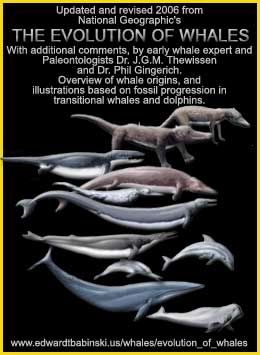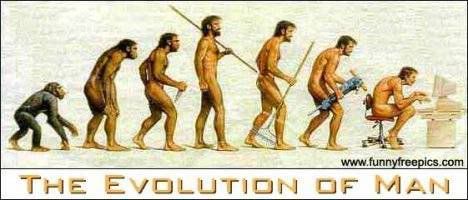If you have any nervous creationist types in the vicinity, you might want to make a scene so they see this on your computer screen.

A major evolutionary innovation has unfurled right in front of researchers' eyes. It's the first time evolution has been caught in the act of making such a rare and complex new trait.
And because the species in question is a bacterium, scientists have been able to replay history to show how this evolutionary novelty grew from the accumulation of unpredictable, chance events.
More about this observation at the Michigan State University in East Lansing below the fold...
Before I begin with more of the article from NewScientist, I want to lay some ground-rules. A lot of people don't know what evolution is, and some are sure to misrepresent the whole shebang, so I'm going to do it here before we go any further.
A GENETIC MUTATION'S INITIAL SPARK = PURE BLIND CHANCE, FOR GOOD OR BAD. NOTHING MORE. BUT EVOLUTION IS WHEN THAT MUTATION GETS PASSED ON FOR GENERATIONS, EITHER BECAUSE OF THE MUTATION (OR EVEN IN SPITE OF IT).
Now to bust some of those myths.
Humans evolved from apes we see today, am I right? No. Humans evolved from a primate a few million years ago. And so did the apes we see today. We have a common ancestor.
Just a theory, right? In the same way that stress theory is what engineers use to build buildings, bridges, and keep the wings on airplanes ...yeah, just a theory. 'Theory' and 'law' in science don't have the layman meanings. If they did, you could break the law and then claim to be free of gravity too.
If nobody saw it, it didn't happen. Well, that's a beautiful one now that people HAVE seen it. And seeing as these bacteria didn't evolve to prove evangelical preachers wrong, it's always been a fact of life. That's what we call a weak argument.
There are no intermediate fossils. Ah, you haven't heard about the intermediate fossil remains from the ancestors of whales. Indocetus, Pakicetus and so on.

That's what we call a weak lie!
But it's not testable. Is now. See the answer for "nobody saw it". Logical fallacy again.
Are you saying we're just animals? Yes. 100% yes. Gorillas and chimps have been taught to communicate using symbols and sign-language. Would you say a blind person isn't a person because they don't read letters? Or a deaf person isn't a person because they talk with their hands? We are mammals. Incredible tool-using ones, but we're animals all the same.
Back to the article.
Twenty years ago, evolutionary biologist Richard Lenski of Michigan State University in East Lansing, US, took a single Escherichia coli bacterium and used its descendants to found 12 laboratory populations.
The 12 have been growing ever since, gradually accumulating mutations and evolving for more than 44,000 generations, while Lenski watches what happens.
Twelve colonies, with around 44 THOUSAND generations. If a human generation is every 25 years, that would be comparable to just over one million years of human evolution.
Mostly, the patterns Lenski saw were similar in each separate population. All 12 evolved larger cells, for example, as well as faster growth rates on the glucose they were fed, and lower peak population densities.
But sometime around the 31,500th generation, something dramatic happened in just one of the populations – the bacteria suddenly acquired the ability to metabolise citrate, a second nutrient in their culture medium that E. coli normally cannot use.
Indeed, the inability to use citrate is one of the traits by which bacteriologists distinguish E. coli from other species. The citrate-using mutants increased in population size and diversity.
"It's the most profound change we have seen during the experiment. This was clearly something quite different for them, and it's outside what was normally considered the bounds of E. coli as a species, which makes it especially interesting," says Lenski.
It's just a random mutation. Evolution would mean they'd all have to change. Wrong again. Evolution isn't something that slowly turned us from ape-ancestor into mankind over 5 million years. There was nothing unusual for generations, just an increase in size (did you know the average height of an adult at the end of the Roman Empire was under 5'6"? Any change in size is not proof positive of evolution: it could be down to nutrition).
But then, suddenly, one bacterium emerged with a random mutation. It just so happened that this one E.coli could munch on something the others could not. By pure chance, this one E.coli did not have the food limits the other bacteria had. So it thrived in that environment.
But just to be sure, Lenski used the scientific method...
By this time, Lenski calculated, enough bacterial cells had lived and died that all simple mutations must already have occurred several times over.
That meant the "citrate-plus" trait must have been something special – either it was a single mutation of an unusually improbable sort, a rare chromosome inversion, say, or else gaining the ability to use citrate required the accumulation of several mutations in sequence.
To find out which, Lenski turned to his freezer, where he had saved samples of each population every 500 generations. These allowed him to replay history from any starting point he chose, by reviving the bacteria and letting evolution "replay" again.
Would the same population evolve Cit+ again, he wondered, or would any of the 12 be equally likely to hit the jackpot?
The replays showed that even when he looked at trillions of cells, only the original population re-evolved Cit+ – and only when he started the replay from generation 20,000 or greater. Something, he concluded, must have happened around generation 20,000 that laid the groundwork for Cit+ to later evolve.
Lenski and his colleagues are now working to identify just what that earlier change was, and how it made the Cit+ mutation possible more than 10,000 generations later.
It is said that you could have a million different Earths starting out with life, each with identical environments, and you would never repeat the same evolutionary results twice. This now appears to be the case. There may be millions of other random changes happening to countless forms of life all over the world, but it's almost impossible that a starling in York, England and a starling in New York will ever come into being with the same mutation, arising separately.
But it's all for some end result, right? No, there's no final thing being worked up to, so you can ignore that progression of evolution picture from years gone by. You know: chimp, caveman, us. Unless it's for comedy purpose, of course...

...then it's funny.
Evolution is just a random switching of the chemicals that make up your DNA. Randomness in DNA does strange things, like make some lions in Africa whiter than usual (for example). White lions get ostracized from the pride, so being a pale lion isn't a good thing, unless a new Ice Age gives them the edge in camouflage. Lion DNA has no idea what it's doing, it just randomly changes and 'the good changes' stick purely because those 'good changes' mean the life-form in question is more likely to eat, grow, and reproduce. And the bad changes get you turfed out for spoiling the ambushes.
In the meantime, the experiment stands as proof that evolution does not always lead to the best possible outcome. Instead, a chance event can sometimes open evolutionary doors for one population that remain forever closed to other populations with different histories.
Lenski's experiment is also yet another poke in the eye for anti-evolutionists, notes Jerry Coyne, an evolutionary biologist at the University of Chicago. "The thing I like most is it says you can get these complex traits evolving by a combination of unlikely events," he says. "That's just what creationists say can't happen."
Thus saving me having to argue the whole '747 built in a scrap-yard' argument, because that isn't how evolution works. It works exactly as Charles Darwin said...
As many more individuals of each species are born than can possibly survive; and as, consequently, there is a frequently recurring struggle for existence, it follows that any being, if it vary however slightly in any manner profitable to itself, under the complex and sometimes varying conditions of life, will have a better chance of surviving, and thus be naturally selected. From the strong principle of inheritance, any selected variety will tend to propagate its new and modified form.
And with that, because Mister Charles Darwin had the gall to ask, here's R.E.M with "Man On The Moon" to play us out...


